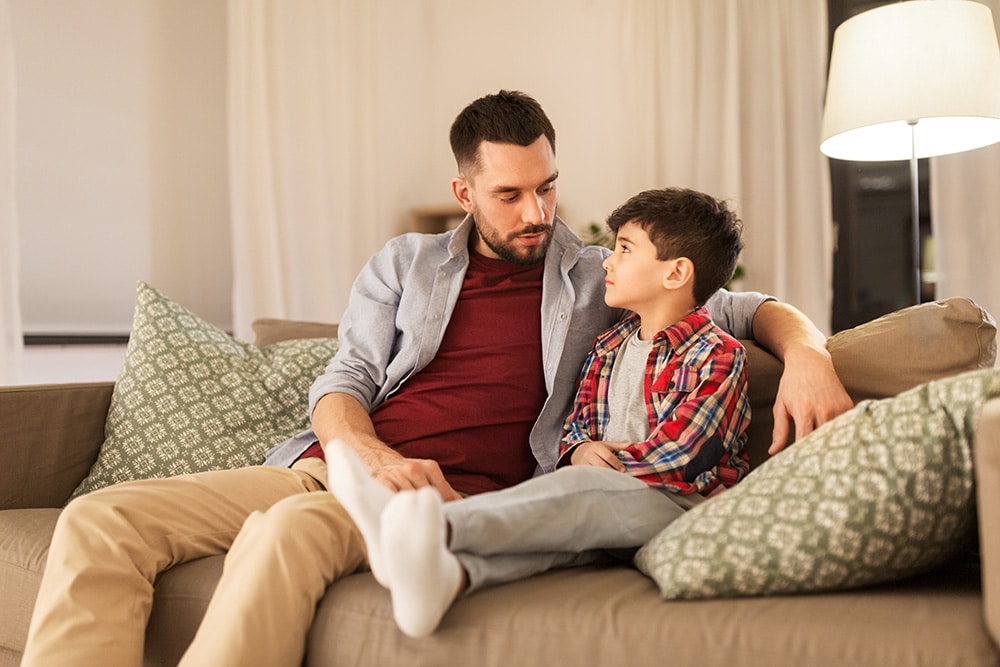
Second, routines help children feel safe. Because they’re still learning the way the world works, routine teaches them what to expect and how to respond. In light of this, consider how the average child entering second grade, who has never had a normal school day in his or her life, feels.
Additionally, children are hardwired to feel safest when they are physically close to their parents. One upside of the pandemic and virtual schooling is that many families have been forced to spend more time together. In many cases, this has helped children feel safer. Returning to school even while things are still so uncertain is causing an increase in the incidence of separation anxiety among children in early-to-middle childhood.
Here are some tips to help you manage your child’s anxiety.
Recognize the signs
Most kids don’t have a well-developed emotional vocabulary. Odds are they won’t approach you and say, “You know, I’m feeling a bit more anxious than usual these days.” Instead, they may start acting out more than usual, be more clingy than usual, or be more quiet and withdrawn than usual. If you notice your child behaving differently or acting as if they are actually trying to get on your nerves, their behavior may be saying, “I’m scared, and I don’t know how to handle it.”
Instead of seeing your child as misbehaving, see them as struggling. Instead of punishing them or yelling at them, help them identify what they were trying to accomplish by acting that way and teach them what to do instead to accomplish that goal in a less irritating way. In general, this is a good approach to parenting, but in times of heightened anxiety, it’s essential. It communicates the message, “No matter what you’re struggling with, you can count on me to help you through it.”
Lead by example
When their adults are calm, kids are calm. Do what you need to do to make yourself feel safe, but watch how anxious or upset you allow yourself to get. Don’t obsess over the latest headlines or COVID counts. Don’t continually rant about all the people who are making different choices than you and how their actions are threatening the public good. Indulging in any of these practices simply makes young children’s stress worse. Process your fears and frustrations privately with your spouse, a close adult friend or a professional counselor, but keep your cool with your kids. The message your children need to be getting from you — from your words, your behavior and your overall demeanor — is, “Yes, COVID is a serious problem, but we are doing everything possible to be safe and keep you safe. The grown-ups are handling things, so you don’t have to worry.”
Ask how they feel
Keeping your cool around your kids doesn’t mean refusing to talk about what’s going on. If you notice your kids behaving differently, if they hear the news or overhear you talking about everything that is upsetting you about the ongoing health crisis, ask them what they think or how they feel. Don’t ask leading questions like, “Are you nervous about X?” Instead simply say, “When you heard about X (or heard me talking about Y) how did it make you feel?”
Don’t try to talk them out of their feelings. That just makes kids feel like you don’t get it. Instead, give them a hug and say something like, “Everybody feels (sad, scared, upset) sometimes and it’s OK that you feel that way. It’s just important to know that I love you and I’m doing everything I can to keep us all safe and healthy. You can count on me.”
Strengthen your rituals and routines
Again, kids feel safest with routine. Work to make a regular at-home schedule for meal times, bed times, etc. Build in a little time to work, play, talk and pray together everyday. Spending 5-10 minutes a day on each of these activities can spell the difference between a calm, connected home and an anxious, disconnected one.
Unfortunately, we can’t prevent our kids from feeling anxious or insecure, but we can give them healthy ways to process those feelings and help them feel safe again.
Dr Greg Popcak is the director of CatholicCounselors.com and the author of many books, including “Parenting Your Kids with Grace” (OSV, $15.95).





